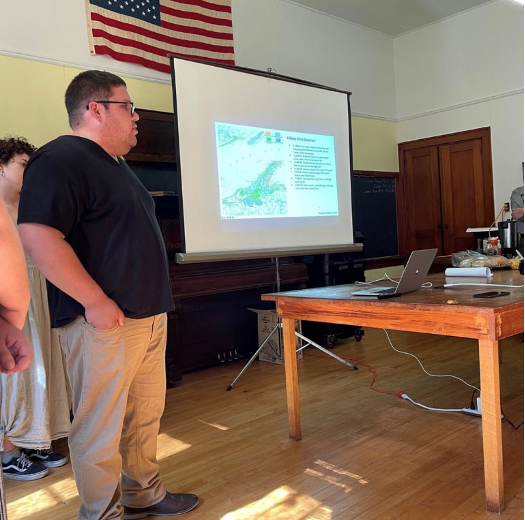Hello! My name is Robert Hazen, and I am a Social Sciences major here at Michigan Technological University. This summer I took the four-week course, Documentation of Historic Structures, led by Dr. Sarah Fayen Scarlett (Michigan Technological University), Dr. Hilary-Joy Virtanen (Finlandia University),
and Dr. John Arnold (Keweenaw National Historic Park) where our class was immersed in the history and documentation of the Kemppa Farm in Misery Bay.
While many of us have not done documentation work before, we all brought different skill sets to the table and were able to add new skills to our toolbox. All of us came from different backgrounds, have different experiences, and even have different perspectives—all of which are useful in an immersive class like this, especially when hashing out the historic details concerning genealogy, timelines, and land and building use. Over the course of these past four weeks, I feel like we have all grown together, and we have all worked together quite well.
While it feels like you have just met these students, time moves quickly, and we are at the end of the course. We all forged new friendships and part of me is sad that it is over. I am sad that we all did not have more time together, but I am also sad that we left some questions unanswered. When you give a presentation to a community about their community, you are coming to them with the knowledge that they may or may not know, but there are also questions that will go unanswered. I think the one thing about this work is that I am only 95% satisfied with the finished product and 5% disappointed that I can never answer every question.
For this project, I researched and put together slides for the deep-time overview of the Keweenaw Peninsula with a specific focus on Misery Bay. I used my skills as a researcher to find digitized census records, plat maps, historical aerial images, homestead deeds, genealogical records, and other historical documents. This helped guide us in developing a timeline for the Kemppa Farm but given our time restraints and research limitations—the lack of digitized records or records hidden behind a paywall—we never were able to piece together some pieces of the puzzle.
Regardless of our limitations, our class exceeded everyone’s expectations, including our own. While we can all come away with a list of different skill sets, we all should come away with viewing people, buildings, and landscapes through a different lens than those around us—appreciating the time and efforts of past people in shaping the landscape to create a life of their own.
Finally, as an Indigenous scholar, one of my goals is to highlight the importance of Indigenous land use in the Upper Peninsula, acknowledging that we are on the ceded territories of Ojibwe homelands. It is important to acknowledge and understand the importance of land for Ojibwe Peoples, especially the land around Misery Bay. While we do not know the extent of Ojibwe settlements in Misery Bay, historic maps and newfound evidence provides us with more pieces to the puzzle.
While I come away from this course with a renewed sense of appreciation of the past, it is always important to look to the future and think about historic preservation efforts for sites like the Kemppa Farm. I want to thank Dr. Sarah Fayen Scarlett, Dr. Hilary-Joy Virtanen, and Dr. John Arnold for sharing with us all their knowledge and providing us with new tools to navigate the world around us. This was an unforgettable experience, and I know that this group of students is destined to do great things with their futures. I could not be prouder of the work we all put in. Thank you!
Robert Hazen is a Social Sciences major at Michigan Technological University. He is the 2022 winner of Michigan Tech’s Outstanding Future Alumni Award given to recognize the contribution of a student volunteer who supports the Alumni Engagement mission of “Celebrating Traditions. Creating Connections.” Consideration is given to students who are making a difference, and demonstrate a commitment to the success of an existing Michigan Tech tradition, or create a new one!
